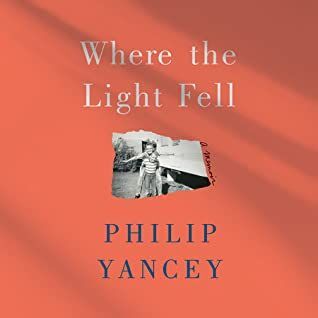Where the Light Fell, by Philip Yancey

Looking back over this blog reminds me that there was a time in my life when I read a lot of Philip Yancey’s books — in fact, he was one of my most influential writers along my spiritual journey at one point in my life — but that most of that reading was before 2006 when I started this blog. The only Yancey book I’ve read since then was Finding God in Unexpected Places, which was a fine book, but didn’t have the impact of earlier books of his like What’s So Amazing About Grace? and Soul Survivor, which were so essential to me in defining my own path as a Christian.
When I heard Yancey had written a memoir that takes a deep dive into his own troubled family life and very fundamentalist Southern upbringing — stories he has touched on but not explored fully in earlier books — I knew I had to read it (or listen to it, actually, read by the author). Where the Light Fell is a thoughtful, sensitive, beautifully-written and sometimes heartrending story about Yancey’s childhood and youth, and, especially, about his relationships with both his mother and his brother. As is often the case with memoirs, there were questions left unanswered that I would have liked to know the answers to, but I always remind myself you can’t blame someone for writing the book they wanted to write and not including everything I wanted to read about.
Up until the last quarter of the book, you might be forgiven for assuming that this is the memoir of someone who left their Christian faith behind entirely — deconstructed, as we might say now — rather than that of someone who has become known and beloved as one of the most celebrate evangelical Christian authors of the late 20th century. It’s clear Yancey was deeply scarred by the dynamics of his own family and by the racist, ultra-fundamentalist churches in which he grew up, yet somehow in late adolescence he discovered a God of grace and went to write about God’s grace for the rest of his career. His brother chose a different path, and much of the last part of the book is devoted to exploring the relationship between Philip Yancey, Marshall Yancey, and the mother who dedicated both boys to God’s service when they were only toddlers.
As is often the case with novels and memoirs about people’s religious backgrounds, there were things in Yancey’s story that were very unfamiliar, almost alien to me, about him growing up as a Southern fundamentalist in the 1950s and going to Bible college in the 1960s — while other things were oddly familiar from my own experience growing up Seventh-day Adventist in the 1970s. One thing that gave me a lot of think about here is that some of the things Mildred Yancey did to her children — dedicating them to God’s service and telling them they would grow up to be missionaries, and praying that God would do “whatever it takes” to bring them back to Him when they strayed — are so common and acceptable among Christian parents, yet the Yancey family’s story shows how these practices can actually be a form of religious abuse.



